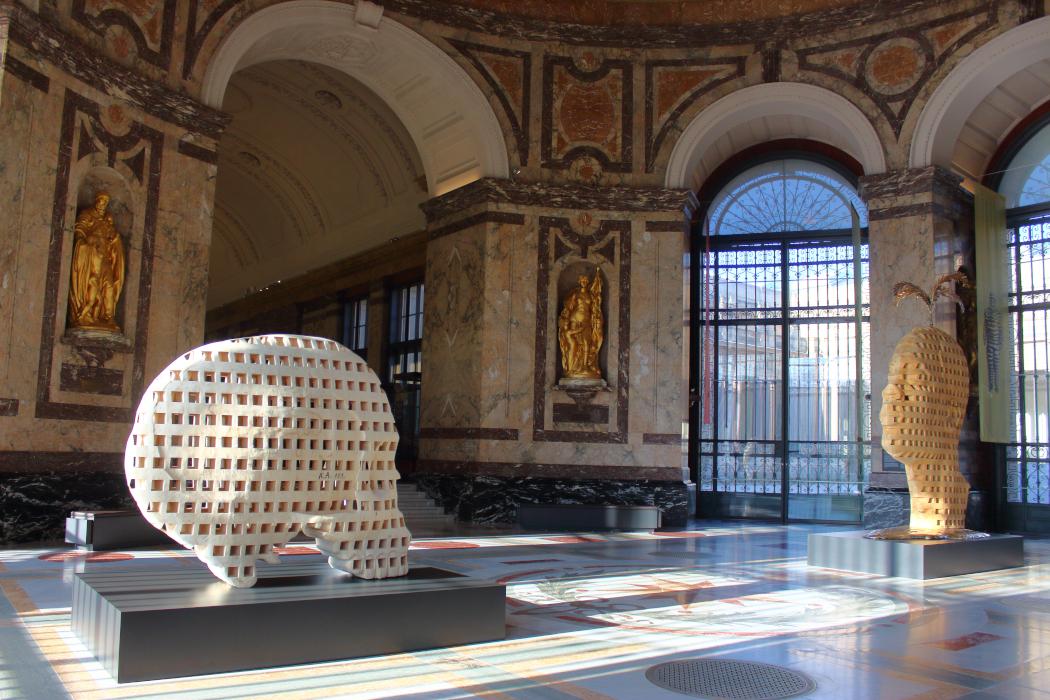Quel avenir pour les restes humains ?
MuseumTalks
Suzanne Monkasa, Paul Shemisi, Stéphane Kabila & Lies Busselen
Moderation: Marie-Reine Iyumva
Several Belgian institutions keep human remains from other countries in their collections. Since 2019, the AfricaMuseum has been collaborating with six museums and universities in the HOME project (Human Remains Origin(s) Multidisciplinary Evaluation). Researchers of the HOME project continued the inventory of all non-Belgian human remains kept in federal collections. They try to gain a better understanding of how and why these human remains entered museum collections.

Aimé Mpane's works, including the skull sculpture of Chief Iwa Ng'ombe Lusinga in the large rotunda of the AfricaMuseum. The skull is part of the inventory of human remains. The inscription of a register number on the original skull was reproduced by Aimé Mpane on this sculpture.
The AfricaMuseum focused on human remains from the colonial period and carried out provenance research in the colonial archives and field research in the DR Congo. Together with Congolese partners, the AfricaMuseum tried to capture how people in the DRC think about these problematic and painful 'collections' today. The Congolese partners – the Collectif Faire-Part in Kinshasa, the WAZA cultural centre in Lubumbashi and the Institut des musées nationaux du Congo (IMNC) – engaged in a dialogue with museologists, academics, politicians and descendants in the DRC.
What information did this research reveal? How were the various interlocutors involved both in the DRC and in Belgium? And what are the prospects for the return of the remains?
During this MuseumTalk, Marie-Reine Iyumva (AfricaMuseum public services) moderates a conversation with researcher Lies Busselen (AfricaMuseum), human rights defender Suzanne Monkasa (Platform of the Women of the Congolese Diaspora in Belgium), filmmaker Paul Shemisi (Faire-Part) and artist Stéphane Kabila (Waza).
About the speakers
Suzanne Monkasa of the Platform of the Women of the Congolese Diaspora in Belgium fights for women's rights in Belgium and Congo. She connects women from the Congolese diaspora with Belgian women's associations. She contributed to the implementation of UN Resolution 1325 within the former Women and Development Commission and drafted initial recommendations for possible repatriation processes as part of the HOME project.
Paul Shemisi started by working as camera assistant for foreign film crews. After having gained experience he studied cinema at Les Ateliers Action, a film program organized by the Superior Institute for Arts in Brussels. He has worked on various films as co-director, scenarist, producer and cameraman, including Renaud Barret’s Système K. He also contributed to the conversations with Congolese interlocutors on the collections of human remains and future possibilities of repatriation in the HOME project in Kinshasa.
Stéphane Kabila has a background in philosophy and curatorial practices. Since 2018, he has been working on critical writing projects for the WAZA cultural centre in Lubumbashi. He recently became artistic director at Livingstone office for Contemporary Art in Zambia and is also a member of the Lubumbashi working group of the cluster Another Roadmap of Arts Education Africa. Currently he leads the artistic program of Afreximbank in Lubumbashi. As part of the HOME project, he initiated talks with Congolese interlocutors on the collections of human remains in Belgium and future possibilities for repatriation in Lubumbashi.
Lies Busselen is a historian and anthropologist. She worked for several years for 11.11.11. and lived for two years in Kinshasa where she worked as a representative of Viva Salud with Congolese movements for the right to health. Afterwards, she immersed herself in dealing with the colonial past in European world museums. Since 2020, she has worked on the provenance of collections of human remains and collaborated with Congolese partners on a network in Congo as part of the HOME project.
Marie-Reine Iyumva has a background in journalism and works in AfricaMuseum's public services as a member of the Partnerships programme. Her work focuses on making the collections accessible to the general public. Marie-Reine worked as a journalist for a few years before turning to the museum world.
MuseumTalks
Join us each month for talks with experts, scientists and artists!

Online
Free, but registration is mandatory